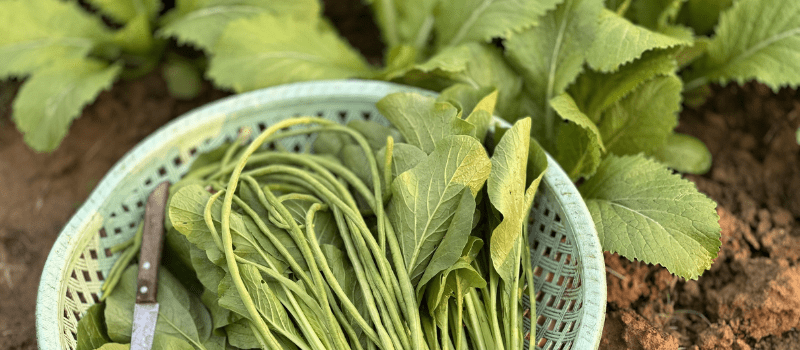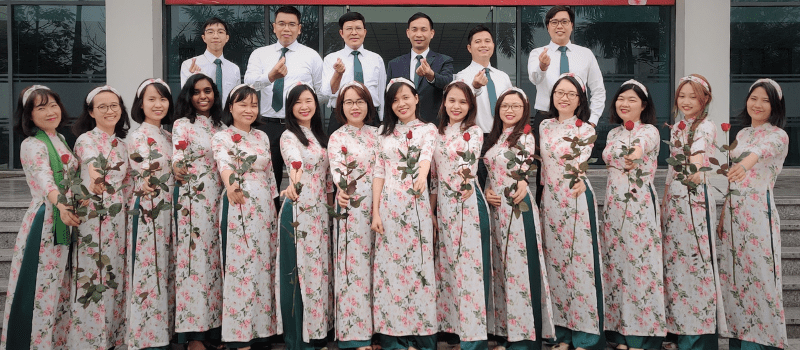This blog was written by Tanja Kisslinger, Advocacy and Communications Technical Advisor at VWB/VSF in reflection of a trip taken to Cambodia in February 2024 to document our Agriculture-based Growth and Resilience Opportunities for Women (AGROW) program.
As rural Cambodian villages face growing challenges from climate change and food insecurity, the AGROW program is empowering rural women farmers and building the resilience of entire communities. By promoting sustainable farming practices and creating One Health Demonstration Sites, AGROW helps women like Ms. Thary Mork, Ms. Ton Sothy, and Ms. Ho Penh strengthen their farms, improve nutrition, and create a more secure future.
Cambodia’s Struggles: Poverty, Food Insecurity, and Gender Inequality
Nearly 80% of Cambodia's population lives in rural areas, relying heavily on agriculture, livestock, and forestry for survival. Despite its natural wealth and favorable conditions for farming, many rural Cambodians face persistent food insecurity and low incomes. The reasons are clear: poor farming techniques, limited access to modern technology, and weak commercialization networks prevent farmers from fully benefiting from their labor. This is particularly true for small-scale farmers, who make up 75% of Cambodia’s 6.8 million farmers and often struggle to meet market demands.
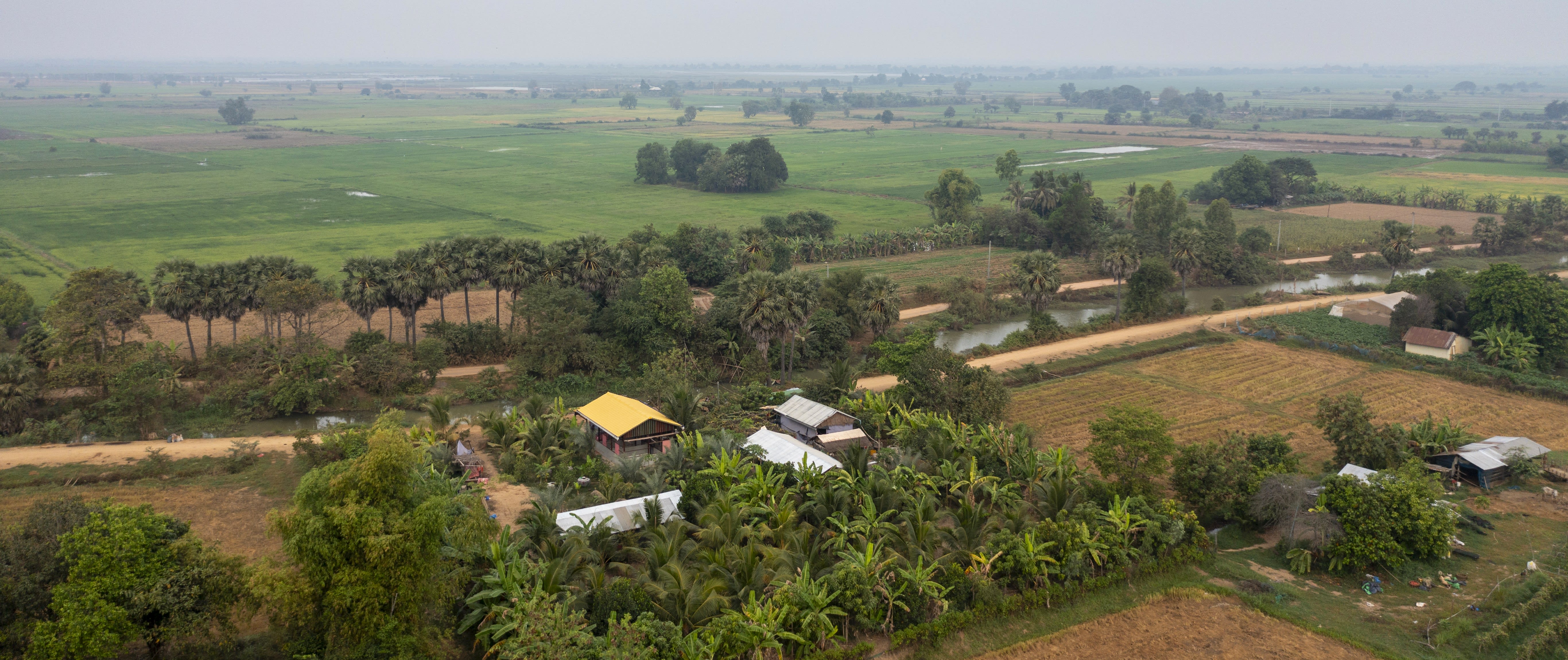 PHOTO: The rural countryside of Cambodia's Battambang province, where AGROW is supporting women in 48 villages across 3 districts.
PHOTO: The rural countryside of Cambodia's Battambang province, where AGROW is supporting women in 48 villages across 3 districts.
The situation has worsened in recent years, with the poverty rate rising to 18%, largely due to the impacts of the COVID-19 pandemic. Around 14.6% of the population is now severely food insecure. For rural women farmers, the challenges are even greater. Many find themselves trapped in low-paying, informal jobs or subsistence farming, leaving little room for growth or investment in their futures. As Thary Mork, a 38-year-old farmer in Aek Phnom District, explains, "Before AGROW, we had chickens but not enough to make a real difference. Now, we’re building a future where farming can truly sustain us."
A New Path Forward: Sustainable Farming and One Health
The AGROW program is providing women farmers like Thary with the tools and training they need to succeed across Aek Phnom, Banan, and Ratanakmondul districts in Battambang Province. A key component of the program is the creation of One Health Demonstration Sites, which showcase sustainable, integrated farming practices that balance the health of humans, animals, and the environment. These demonstration sites serve as on-farm learning spaces where farmers gain hands-on experience in eco-friendly farming techniques like natural fertilization, water management, and crop rotation.
Thary and her husband, Tith Oeun, embraced these sustainable farming practices through AGROW’s One Health Demonstration Sites. Together, they cultivate Chinese curly cabbage, crisp lettuce, Chinese chives, parsley, and bok choy using natural fertilizers. Their farm also includes fruit trees and a large chicken farm, where they raise hens for eggs and chicks to sell. "We rarely eat our own chickens because we love them too much," says Thary, "but the income from selling eggs and chickens has made a big difference for our family."
 PHOTO: Thary Mork at her chicken farm.
PHOTO: Thary Mork at her chicken farm.
 PHOTO: Tith Oeun selling produce at the market.
PHOTO: Tith Oeun selling produce at the market.
 PHOTO: Thary, Tith and their daughter collecting eggs.
PHOTO: Thary, Tith and their daughter collecting eggs.
Tith is involved in every part of the farm’s operations, from feeding and watering the chickens to preparing natural fertilizers and selling produce at the local market. Thanks to their efforts, their daily income from vegetable sales can reach up to 25,000 riels (about $6.25 USD), enabling them to support their children’s education and improve their household’s overall quality of life. "It’s a swift business," says Thary. "Our produce sells out fast, sparing us long hours at the market."
Growing More Than Crops: Empowering Women Farmers
For Ms. Ton Sothy, a 42-year-old widow and mother of three, AGROW provided the opportunity to diversify her farm and improve her income. Before joining the program, she grew only chili peppers—a crop that limited both her nutritional options and her earnings. With AGROW’s support, she learned how to grow a variety of vegetables, including eggplant, Bok choy, and green beans. This has not only increased her earnings but also improved the nutritional diversity of her family’s diet.
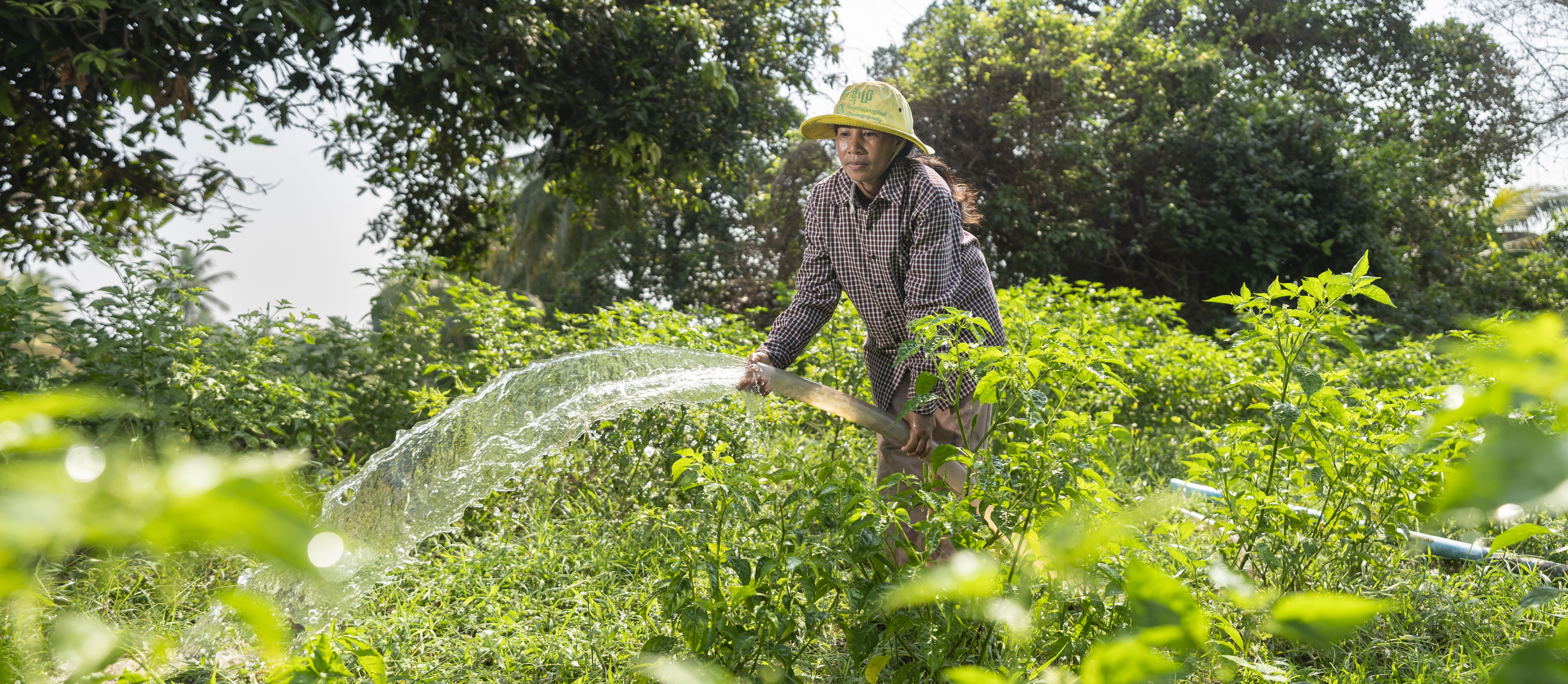 PHOTO: Ton Sothy, hard at work, watering her massive vegetable gardens in Baydamram Village, Banan District.
PHOTO: Ton Sothy, hard at work, watering her massive vegetable gardens in Baydamram Village, Banan District.
“Before AGROW, I didn’t know how to improve my farming techniques,” says Ms. Ton. “Now, I have a much wider variety of crops, and I can sell more at the market.” Her thriving vegetable garden has even allowed her to hire additional help, further increasing her productivity.
Similarly, Ms. Ho Penh, a 46-year-old farmer and mother of nine, found transformative support through AGROW. In addition to running a One Health Demonstration Site in Chamkar O village, Banan district, she and her husband manage a large homestead with cows, chickens, vegetable crops, and fruit trees. Through AGROW’s Cow Bank initiative, she also received a cow which is now pregnant. Once the calf is born, Ms. Ho will pass the cow on to another farmer, ensuring this sustainable model benefits her community. “The Cow Bank has given me the chance to grow my farm in ways I couldn’t have before,” she says.
Her One Health Demonstration Site promotes eco-friendly farming practices, and her farm recently harvested 120 kilograms of fresh vegetables, ginger, and bok choy—all grown without harmful chemicals. AGROW’s agricultural and gender equality training have also made a difference in her home life. “Now my husband helps with cooking for the children and caring for the cows. We share the responsibilities,” she reflects.
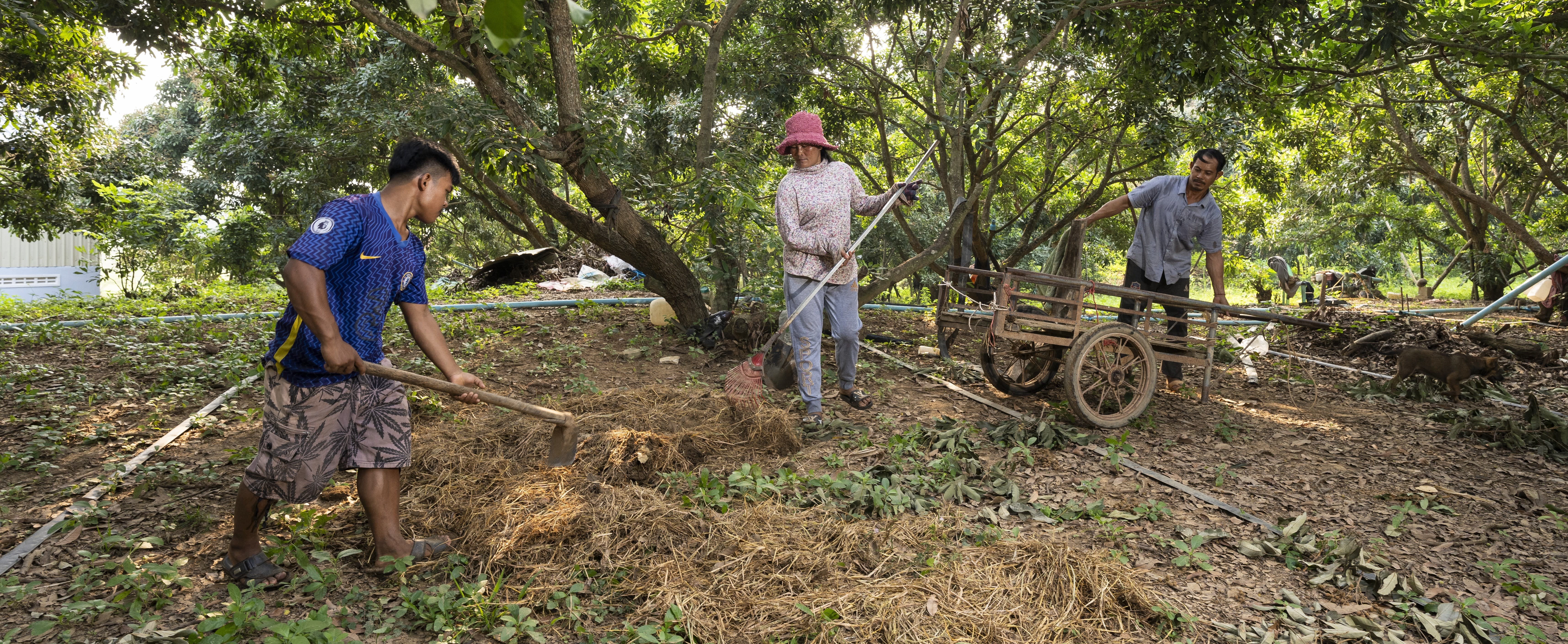 PHOTO: Ho Penh works together with her husband and son to spread fertilizer at the family farm.
PHOTO: Ho Penh works together with her husband and son to spread fertilizer at the family farm.
AGROW’s ability to support diverse livelihoods is further demonstrated through the success of Ms. Kimsiek Sokea, who turned to cricket farming for financial stability. After attending AGROW’s training in sustainable cricket farming, she harvested 35 kilograms of crickets during her first cycle, selling them for 10,000 riels per kilogram. “Without AGROW, I would still be struggling as a laborer. Now, I have savings for my child’s education,” she shares.
Kimsiek’s success showcases AGROW’s commitment to creating diverse income opportunities for rural women, ensuring that each farmer finds the best fit for their unique context—whether through traditional livestock, crop farming, or more innovative ventures like cricket farming.
Building a Future of Resilience
The AGROW program’s comprehensive approach—blending sustainable farming, livestock management, and gender equality—is already transforming the lives of thousands of women in Cambodia. Since 2021, AGROW has been making a positive impact on more than 20,022 individuals, 70% of whom are women. Through One Health Demonstration Sites and climate-smart agricultural practices, the program equips farmers to build resilience, diversify their crops, and improve food security in their communities. These efforts are contributing to Cambodia’s broader food security goals, demonstrating that sustainable agriculture is a powerful tool for reducing poverty and fostering long-term economic stability in rural areas.
Most importantly, AGROW’s successes remind us that investing in women farmers is essential to overcoming food insecurity and building a sustainable future. Women like Thary Mork, Ton Sothy, Ho Penh and Kimsiek Sokea are leading the way, proving that with the right tools and support, rural women can not only feed their families but also improve the health of their communities and the environment.
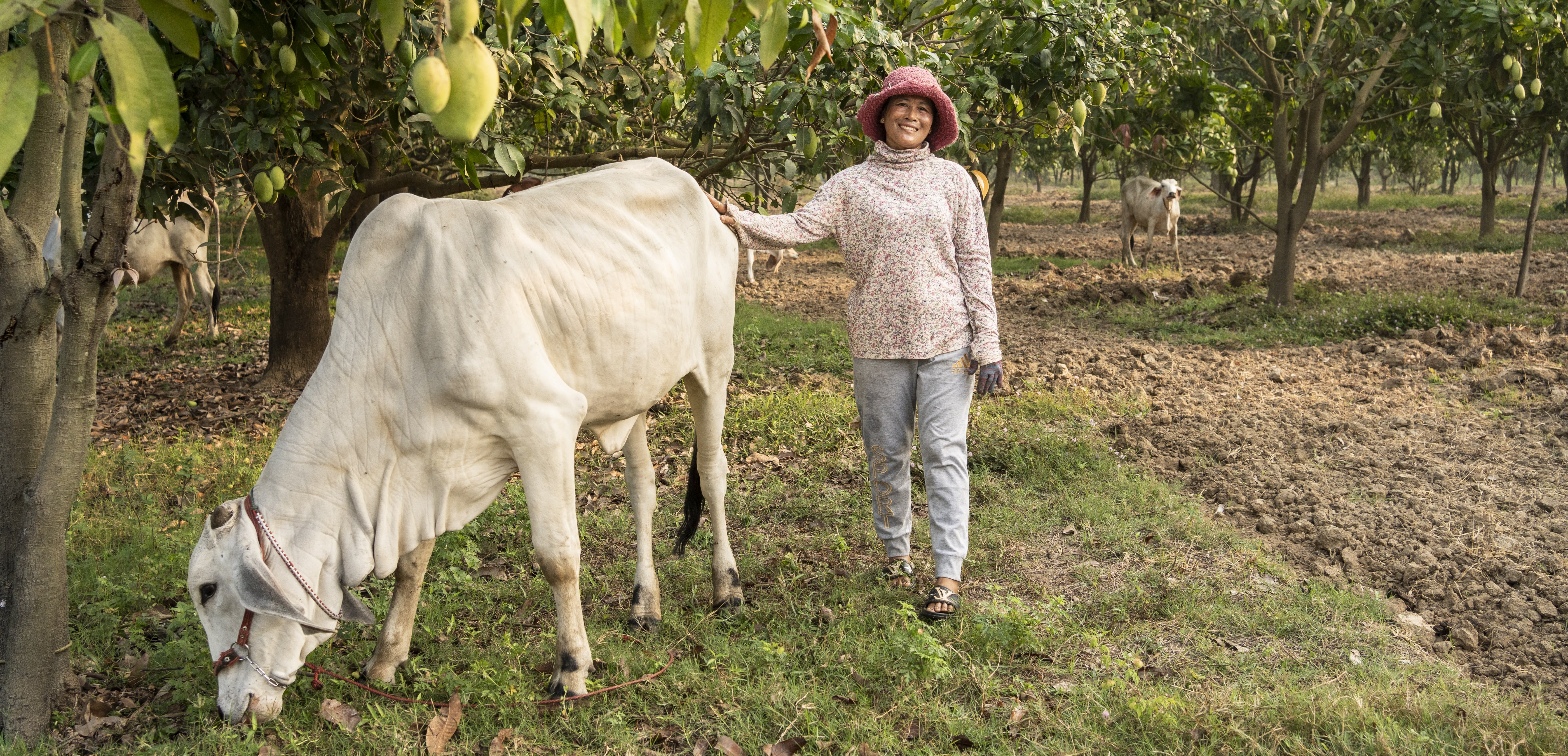 PHOTO: Ho Penh with the cow she received through AGROW’s Cow Bank initiative. Now 2 months pregnant, the cow will soon help expand her farm and support her family’s livelihood.
PHOTO: Ho Penh with the cow she received through AGROW’s Cow Bank initiative. Now 2 months pregnant, the cow will soon help expand her farm and support her family’s livelihood.
AGROW is a 3-year program aimed at enhancing the resilience of women and girls in three districts of Cambodia’s Battambang province through animal, human, and environmental health (One Health) initiatives, and is generously funded by Global Affairs Canada. Learn more here.

